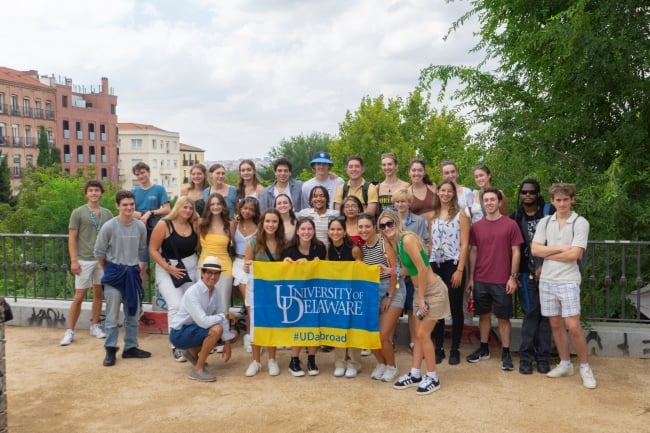You have /5 articles left.
Sign up for a free account or log in.

University of Delaware students can study abroad twice during their college career through the World Scholars Program, which provides a four-year international experience for participants.
University of Delaware
Study abroad as a form of experiential learning teaches college students to be adaptive, problem-solvers, culturally responsive and exploratory.
The University of Delaware offers a four-year international experience for students hungry for travel and learning, sending students abroad twice throughout their college career while creating community on campus with special programing, a residential experience and seminars.
The World Scholars Program, open to students of all backgrounds and disciplines, recently received Faculty Senate recognition in 2022, putting the program on student degree audits and transcripts as well.
What’s the need: Demand for study abroad after COVID-19 has grown, according to spring 2023 data from the Institute of International Education (IIE). In 2022-23, 83 percent of U.S. colleges and universities anticipated increased study abroad numbers year-over-year, and leaders predict additional growth in 2023-24, with 82 percent of institutions predicting higher numbers of participants.
The majority of institutions (55 percent) offer faculty-led study abroad programs, and 14 percent of students are enrolled in programs with at least one special course developed for U.S. or other international students, similar to U Delaware’s offerings.
In 2014, UD launched World Scholars in Rome, enrolling 39 students.
How it works: The World Scholars Program is invite-only. After being admitted to UD, interested students complete an interview with a current World Scholar to be considered. The university admits over 100 students each cohort, with the highest in fall 2021 with 153 students, says Amy Greenwald Foley, director of Global Outreach and Partnerships at the Center for Global Programs and Services.
The ideal candidate is open-minded to other cultures and experiences, resilient, independent and mature, plus has shown commitment to other activities, present or past, and wants to contribute as a member of the World Scholars community, Foley says.
For the first term, all World Scholars will study abroad at one of four partner institutions: American College of Greece-Athens, John Cabot University in Rome, St. Louis University in Madrid, and the University of Auckland in New Zealand. Students rank their preferences for institutions, with a majority placed in their first-choice but others limited by academic programs or age restrictions.
Staff travel with students for the first two weeks and final week of the semester abroad, and all participants live together in residence hall rooms.
After finishing the first term, students attend Transitions Day on campus with their families to help them acclimate to UD’s campus and participate in a World Scholar section of the first-year seminar. “During this time, we maintain a presence during their on-site orientation, accompany students on planned excursions, facilitate any changes to the students’ academic schedules, and meet one-on-one with each student before our departure,” Foley says.
First-years also participate in cohort excursions such as a local cooking class and have an opening and closing celebration. Upper-division World Scholars serve as near-peer mentors at the four sites, as well, providing encouragement and guidance.
During their second year, World Scholars are required to live in an international living learning community, iHouse. International and upper-level students are encouraged to live in iHouse. The LLC hosts iHouse Culture Nights, which explore different cultures and holidays. This fall, for example, iHouse will host a Diwali Festival of Lights event in November and Comfort Food and Chili Potluck in December.
Junior year, students study abroad again and complete an internship, research project or service-learning experience. “Studying abroad for a second time requires a great deal of advance planning and coordinated campus-wide efforts,” Foley says.
Students have significantly more program choice in their third year, which requires help from academic advisers and global programs staff. “The Registrar’s Office is also a valuable partner and resource as students earn academic credit for their studies abroad, requiring lengthy course equivalency review and support for students who pursue study abroad outside of UD program offerings,” Foley says.
Their final semester before graduating, World Scholars participate in a Spring Symposium, in which they complete a project that draws on their experiences over the past four years.
Throughout their time at the university, World Scholars receive advising, resources and support from UD staff and international partners. Students studying at the American College of Greece in Athens are also eligible for a scholarship program founded by current president and first lady Dennis and Eleni Assanis.
The impact: Since launching in 2015, around 1,000 students have participated as World Scholars. In 2015, approximately 11 percent of participants were minority scholars, and this past cohort was 33 percent minority students. Alumni of the World Scholars Program represent over 100 majors.
Program outcomes include students identifying their acquired intercultural skills and abilities, having a sophisticated understanding of cultural norms and complexities, flexibility, participation in cross-cultural dialogue, diplomacy, and developing relationships with a global university community, according to UD’s website.
Alumni of World Scholars are more likely to pursue graduate education, and many participate in international scholarship programs, including Boren, Critical Language, Gilman and Fulbright.
If your student success program has a unique feature or twist, we’d like to know about it. Click here to submit.




